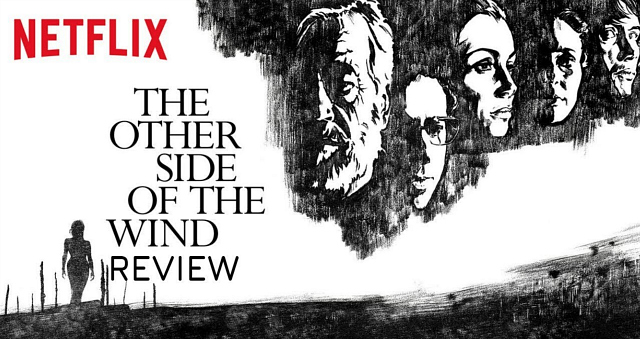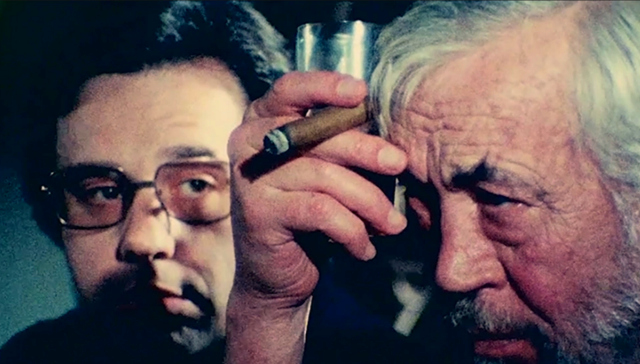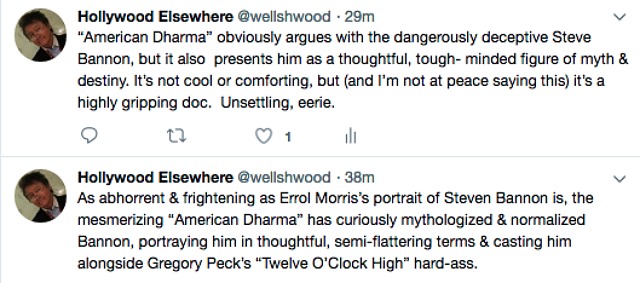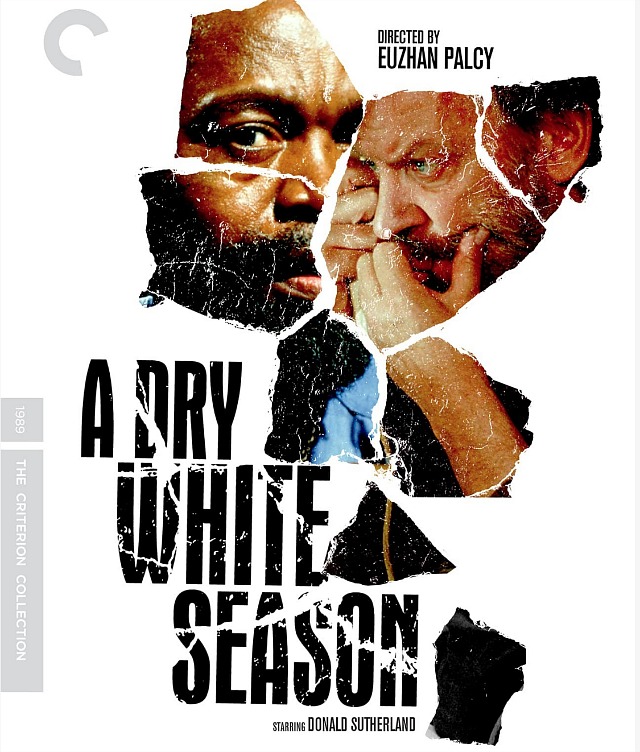Come to think of it, the reason I choose to write Hollywood Elsewhere every day is…well, it’s complicated. But I certainly don’t do it because it’s easy. I do it because it’s hard.
Day: September 19, 2018
Sorry But Welles’ “Wind” Isn’t Much
I saw Orson Welles‘ The Other Side of the Wind yesterday. It’s a bitter, cynical, sometimes darkly funny hodgepodge, an inside-new-Hollywood movie that was filmed on the fly between 1970 and ’75 in various formats, and a film that has a lot on its mind but has crawled so far up its own ass that the viewer can’t hope to enjoy much access.
It’s not a good film. Any film that makes you say “wait…what’s happening?” or “what was that line?” over and over is doing something wrong. It’s so damn spotty and splotchy. So scatter-gun, so haphazardly chop-chop and cut-cut. It never achieves a rhythm or a sense of flow-through or harmony of any kind. Within 10 or 15 minutes I was feeling exhausted.
It’s about an old craggy director named Jake Hannafort (John Huston) who sees himself as cut from the Ernest Hemingway cloth, and who’s just back from Europe and trying to find money to finish a film or start a new one or something along these lines. And so he throws a party in the desert and dozens attend — rivals, colleagues, managers, film critics, sycophants, students with cameras, wannabes, old friends.
Nobody ever seems to actually converse in an engaging, back-and-forth way. Nobody seems to listen to anyone else. It’s all bitter talk, fuck talk, belch…bitter talk, fuck talk, belch…bitter talk, fuck talk, belch…bitter talk, fuck talk, belch…bitter talk, fuck talk, belch, etc.

It would be one thing if everyone was improvising and Welles was gradually threading their material into some kind of half-assed narrative that delivered some kind of attitude or metaphorical mood, but everyone (and I mean especially the name-brand actors) is (a) “acting” and (b) obviously “speaking lines,” and it just doesn’t work.
Withered, craggy-faced Huston keeps puffing away on that cigar and regarding everyone with suspicion or disdain or a combination of both. Lili Palmer (a replacement for Marlene Dietrich) just sits around and says her lines in a deadpan way. Chubby-faced Peter Bogdanovich (playing a hot young director named Brooks Otterlake) says his lines with a tone of wry self-amusement. Susan Strasberg (a Pauline Kael stand-in) says her lines in a kind of needly, challenging way. Cameron Mitchell just hangs around and says his lines; ditto puffy-faced Edmond O’Brien. Paul Stewart says his lines in the usual Stewart way…seen it all, heard it all. Joe McBride says his lines with a certain sardonic edge. But I couldn’t latch onto anything or anyone. The film refuses to sink in.
Where is this going? What is there to learn or care about? Where is the soul of this film? Who wants to wade through this fucking mess of a movie? This is so inside-baseball I’m getting a headache.
Nothing really happens except that (a) everyone on the studio lot is invited to Jake’s party in the desert, (b) everyone arrives at the desert-house party and starts making sage, cutting remarks about this, that or another thing…yap-yappity-yap-yappity-yap-yap, (c) everyone becomes more and more drunk and cynical and despairing, (d) everyone heads for an outdoor drive-in to watch Jake’s movie, and then (e) Jake drives off in a Porsche and dies. (Except he does this at the very beginning, or before the beginning)
Robert Altman used to be so much better at this kind of thing — he would capture little snips and quips and cut away to this or that and somehow it would all fit together, but Orson’s film is so fucking “written out” and everyone is so determined to “act” (i.e., sell the moment, charm the audience) as well as radiate cynical or bitter or burnt-out or testy or pissed-off attitudes or feelings.
Does anyone in this film care about anything or anyone? I didn’t give a fuck about anyone or anything. At all. It really, really doesn’t work.

Condemning But Also Mythologizing
Errol Morris is no admirer of former Trump administration svengali Steve Bannon, and so American Dharma, which I saw yesterday afternoon, casts significant doubt upon Bannon’s overthrow-the-deep-state, hooray-for-the-red-hats bullshit. But at the same time it does a curious thing — it presents Bannon as a half-mythical figure, a man of steel and conviction, tough-minded but thoughtful.
If you have a semi-developed brain and at least some analytical abilities, you’re going to recoil in quiet horror at what Bannon is advocating here, but at the same time you’re going to be half-impressed by the way he comes off as a cinematic figure, as a fellow who’s part of a fraternity of strong, square-jawed honey badgers (including Gregory Peck in Twelve O’Clock High, Alec Guinness in The Bridge on the River Kwai) who don’t give a shit but are determined to get the job done. Right-wingers may feel conflicted about American Dharma (as I do) but they’re not going to flat-out hate it. Because there’s something faintly attractive about the way Bannon is portrayed.

I agree almost entirely with Michael Moore‘s Fahrenheit 11/9, but American Dharma, troubling as it is, is a more transporting film, certainly in a visual sense.
“To call Donald Trump a man of the people…I don’t quite see it. Forgive me. I see something quite different. [American Dharma] is a horror movie. I’m not sure I know what evil is. I don’t really believe in evil-evil. Even ‘evil incarnate’ troubles me. I certainly believe in evil acts, which are all around us, constantly. I don’t know if you’ve seen my other films, but I’m endlessly fascinated by self-deception [and] cluelessness.
“[American Dharma] is certainly a story about a man who lives in a strange fantasy world. Early Christianity, John Ford movies, nationalist ideologies…an incoherent mess, in my opinion. It’s not clear to me that if you surround yourself with this shell of belief you don’t see the world any more. What [Bannon] talks about, what he believes is incoherent…it doesn’t really make sense. Bannon seems the most ridiculous, most absurd when he couples his claims, his populist claims, national populist claims with his defense of the Trump administration. [In my view] Trump does violence to the whole of idea of what populism might be.” — Errol Morris, director of American Dharma, an exploration of the mind and ideology of Steve Bannon, during a Toronto Film Festival q & a.
Re-Saluting Reitman’s “Front Runner”
Less than ten minutes into my first viewing of Jason Reitman‘s The Front Runner, I knew it was at least a B-plus. By the time it ended I was convinced it was a solid A. It’s not a typical Reitman film — it doesn’t deliver emotionally moving moments a la Juno and Up In The Air. It is, however, a sharp and lucid account of a real-life political tragedy — the destruction of former Colorado Senator Gary Hart‘s presidential campaign due to press reports of extra-marital womanizing with campaign volunteer Donna Rice.
The Front Runner is an exacting, brilliantly captured account of a sea-change in press coverage of presidential campaigns — about a moment when everything in the media landscape suddenly turned tabloid. Plus it feels recognizable as shit. I immediately compared The Front Runner to Michael Ritchie’s The Candidate, Mike Nichols‘ Primary Colors and James Vanderbilt‘s Truth. It is absolutely on the same wavelength and of the same calibre. Hugh Jackman delivers a steady, measured, well-honed portrayal of Hart, but the whole cast is pretty close to perfect — every detail, every note, every wisecrack is spot-on.
Why, then, are some critics giving Reitman’s film, which is absolutely his best since Up In The Air, the back of their hands? The Front Runner easily warrants scores in the high 80s or low 90s, and yet Rotten Tomatoes and Metacritic aggregate tallies are currently in the high 60s — over 20 points lower than they should be.
I’ll tell you what’s going on. Critics can be cool to films that portray journalists in a less than admirable light, which is what The Front Runner certainly does. The Miami Herald reporters who followed Hart around and broke the Rice story are depicted as sleazy fellows, and the relationship between the Miami Herald and Hart is depicted as deeply antagonistic, especially on the Herald’s part. Hart screwed himself with his own carelessness, but the Herald is depicted as being more or less on the same level as the National Enquirer.
You can bet that on some level this analogy is not going down well with certain critics. Remember how Vanderbilt’s Truth (’15), a whipsmart journalism drama, was tarnished in the press for portraying the collapse of Mary Mapes‘ faulty 60 Minutes investigation into George Bush‘s National Guard history and alleged cocaine use? A somewhat similar dynamic is happening right how.
Brando vs. South African Apartheid
On 12.11, Criterion will release a 4K-scanned Bluray of Euzhan Palcy‘s A Dry White Season (’89), an anti-apartheid drama. I remember Marlon Brando‘s brief but lively performance as South African barrister Ian McKenzie (which resulted in a Best Supporting Actor Oscar nomination), but that’s all. Donald Sutherland played the lead, and the costars were Janet Suzman, Susan Sarandon, Jurgen Prochnow and Michael Gambon. The film was generally well-reviewed, but I honestly don’t recall anything about the plot.
Wikipage excerpt: “Brando was so moved by Palcy’s commitment to social change that he came out of a self-imposed retirement to play the role of the human rights lawyer; he also agreed to work for union scale ($4,000), far below his usual fee. The salaries of Sutherland and Sarandon were also reduced. The film was budgeted at only $9 million.”

Tell Your Life Story in 7 Words
If you consider “a” to be a word, my seven-word summary is “Took a while, but I got there.” If “a” doesn’t count, I prefer “It took a while, but I got there.”
1st HE alternate: “If you trust yourself when others don’t.” 2nd HE alternate (14-word cheating version): “Long and hard is the way that out of hell leads up to light.”
Sidenote: I’ve never liked the idea of “a” being a word. It’s just a letter — it’s not, you know, an actual word. Conflicted, measured, loquacious, randy, uncertain, impudent…those are words that you can really shake hands with. What is “a” really? A neutral, non-judgmental single-digit thingie that you put before a noun. You can call it a word if you want, but I’ve had doubts for decades. If you ask me the jury is still out.
